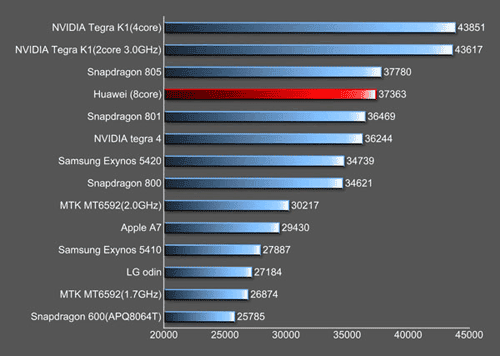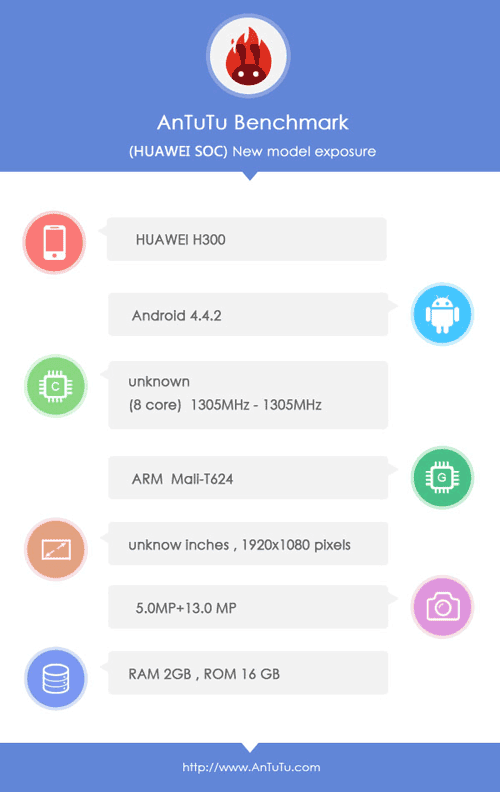Huawei is full of surprises lately but we were not expecting their all new Kirin 920 octacore SoC to be more powerful than the mighty Snapdragon 801!
Earlier today we posted the leaked details of the Huawei Kirin 920 processor which will has 4 x Cortex A7 cores combined with 4 X Cortex A15 which gives enough power to run next generation screen at a resolution of 2560 x 1440 and support 32 mega-pixel cameras (more details here).
With the specs leaked it was only a matter of hours before the first benchmarks of the Kirin 920 hit the web, and they are impressive to say the least! Huawei have created a processor which is not only worthy of their next flagship device, but also worthy of any other manufactures next gen phone (if that were possible!).

According to Antutu score the Huawei Kirin 920 is capable of scoring a whopping 37, 363 points! That makes it more powerful than the Snadragon 800 which will be found in the OnePlus One phone and slight less powerful than the Snapdragon 805!
Impressive stuff! Which makes us even more curious about this next gen Huawei beast we have yet to see!






and Nvidia blows all of them !
😀 😀 😀 I definitely like your comment 😀 😀 😀 hell yeah
Still, nvidia’s chip lacks lte in-die chip, so if performance gap is not that big manufacturers will still choose qualcomm. And that’s good nowadays because qualcomm’s community support is way better than Mediatek’s and I’d say nvidia too though I’m not 100% sure.
and Nvidia blows all of them !
😀 😀 😀 I definitely like your comment 😀 😀 😀 hell yeah
Still, nvidia’s chip lacks lte in-die chip, so if performance gap is not that big manufacturers will still choose qualcomm. And that’s good nowadays because qualcomm’s community support is way better than Mediatek’s and I’d say nvidia too though I’m not 100% sure.
I’m not sure how this can be categorized as a win. They managed to catch up to last years BIG.little Samsung processor. The Snapdragon 801 is a stopgap, just a fast version of last year’s tech. They real comparison will be with Qualcomm’s unannounced 810 and 815.
Plus, at this point, it’s not just about ARM cores, it’s also about LTE support. Qualcomm is on their 4th generation multi-frequency LTE radio, Huawei, MediaTek and the rest of the chase group are all on their 1s generation.
I think by Q2 or Q3 of 2015 the only factor that would determine the use of any branded SoC over another would be pricing.
By that time everyone should be producing 64bit Multiband LTE Octa Core SoC’s.
It shouldn’t even be that difficult to acquire a competitors SoC, reverse engineer it and then tweak the structure of your offering to improve on your own SoC’s performance.
Its a great time to be alive and be able to observe technological growth and advancement.
I’m not sure how this can be categorized as a win. They managed to catch up to last years BIG.little Samsung processor. The Snapdragon 801 is a stopgap, just a fast version of last year’s tech. They real comparison will be with Qualcomm’s unannounced 810 and 815.
Plus, at this point, it’s not just about ARM cores, it’s also about LTE support. Qualcomm is on their 4th generation multi-frequency LTE radio, Huawei, MediaTek and the rest of the chase group are all on their 1s generation.
I think by Q2 or Q3 of 2015 the only factor that would determine the use of any branded SoC over another would be pricing.
By that time everyone should be producing 64bit Multiband LTE Octa Core SoC’s.
It shouldn’t even be that difficult to acquire a competitors SoC, reverse engineer it and then tweak the structure of your offering to improve on your own SoC’s performance.
Its a great time to be alive and be able to observe technological growth and advancement.